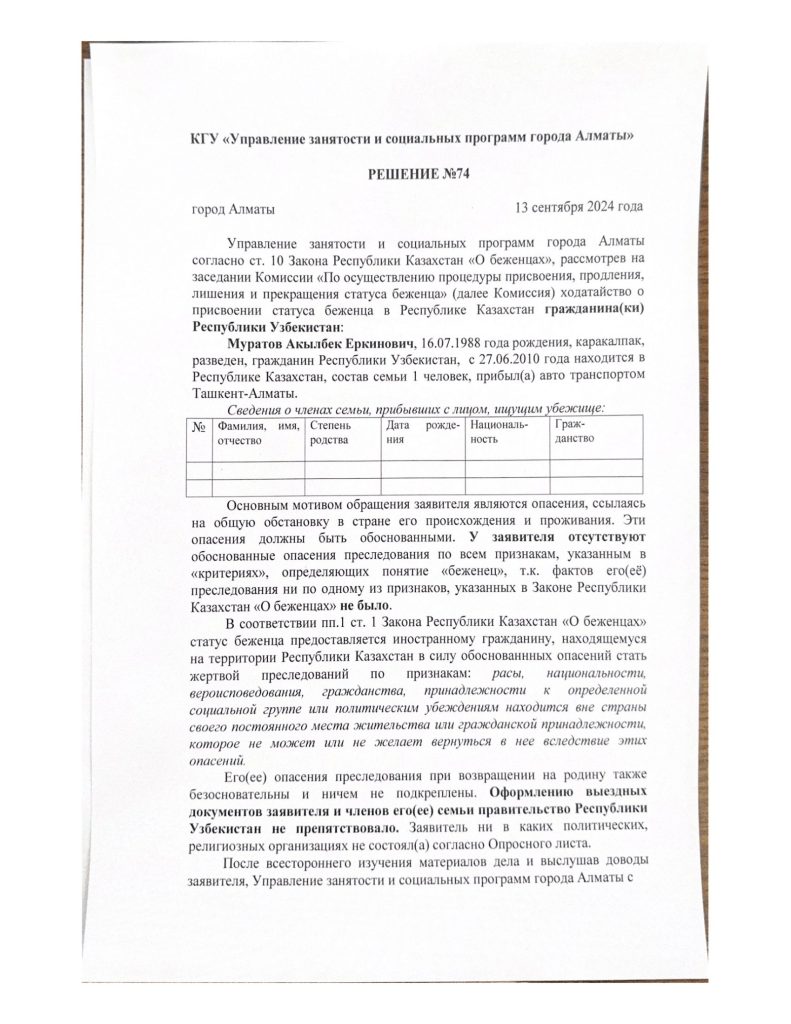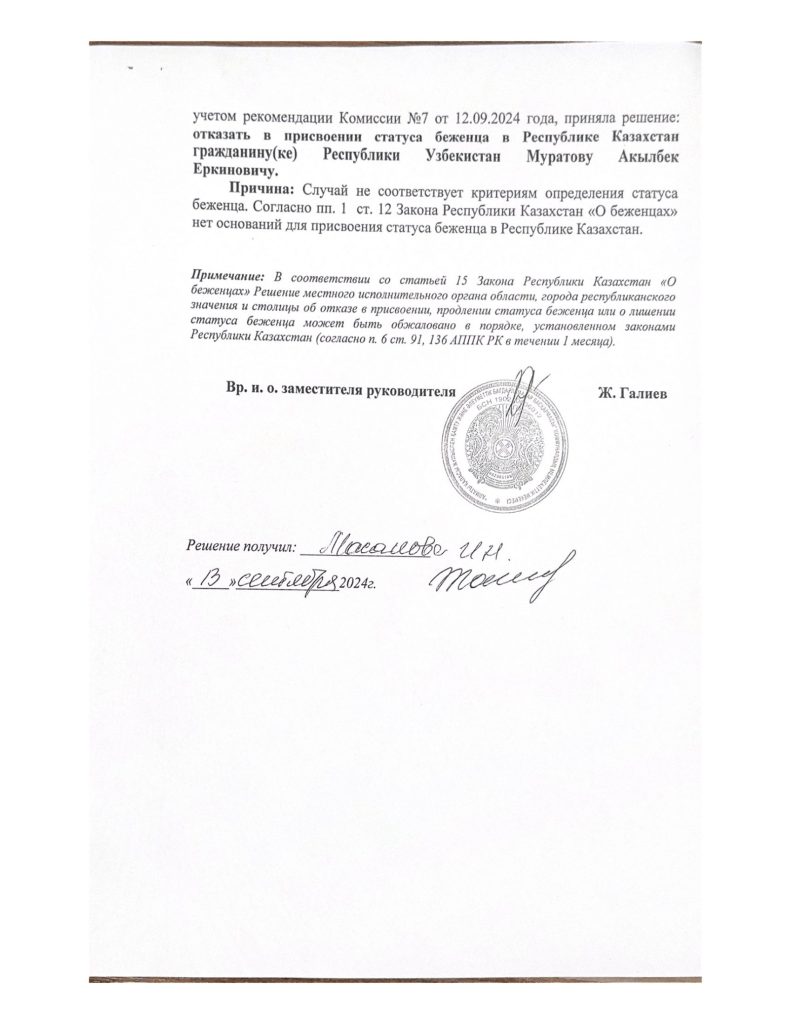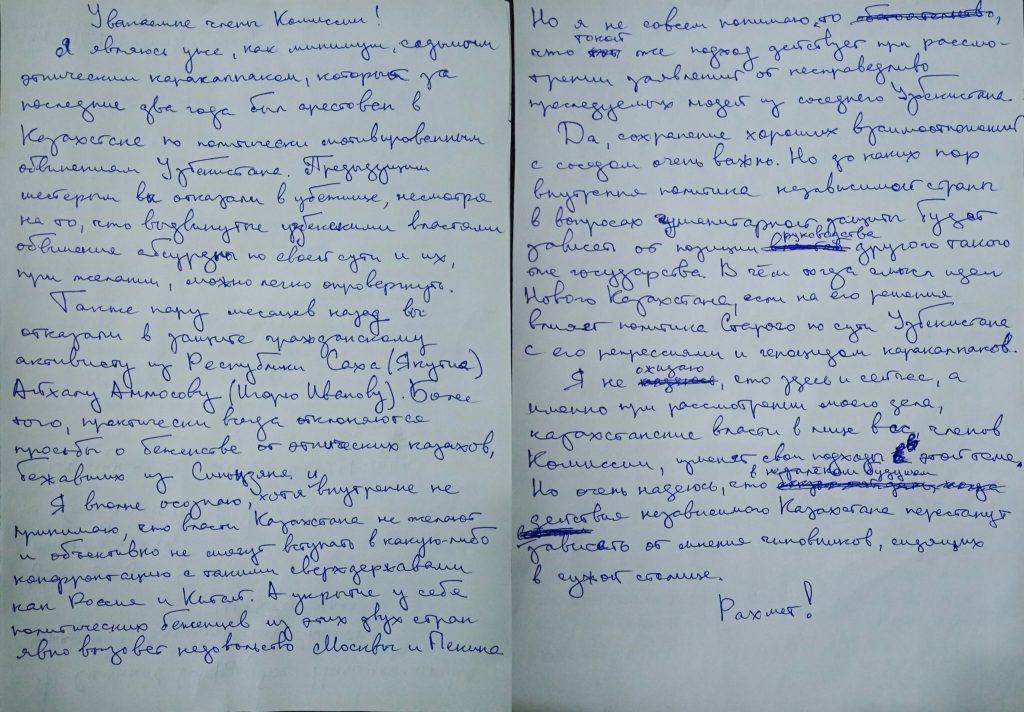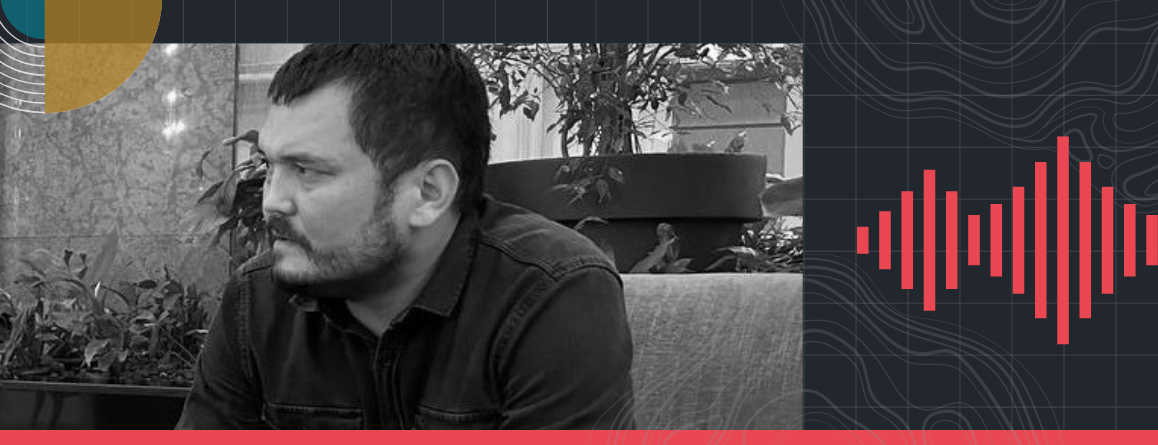On September 13, 2024, the Commission on Refugee Status in Kazakhstan denied the asylum application of Karakalpak human rights defender Akylbek Muratbai (also known as Muratov). The Commission stated in its refusal: “The applicant has no reasonable fears of persecution on any grounds specified in the ‘criteria’ defining the concept of ‘refugee,’ as no facts of his persecution were established on any of the grounds specified in the Law of the Republic of Kazakhstan ‘On Refugees’.”
Kazakhstan’s Law “On Refugees” defines a refugee as: “A refugee is a foreigner who, owing to well-founded fears of being persecuted for reasons of race, nationality, religion, citizenship, membership of a particular social group, or political opinion, is outside the country of his or her nationality and is unable or unwilling to avail himself or herself of the protection of that country due to such fears, or a stateless person who is outside the country of his or her former habitual residence or citizenship and is unable or unwilling to return to it due to such fears.”
Despite the Commission’s statement, several factors suggest that Muratbai meets the criteria for refugee status outlined in the law. The criminal case against him was initiated because he posted clips from a human rights conference organized by the OSCE (#WarsawHDC) on his YouTube channel and organized a peaceful online flash mob in memory of those killed during the suppression of protests in the Republic of Karakalpakstan. Moreover, Muratbai was repeatedly threatened by representatives of the Uzbek embassy in Kazakhstan due to his active social media presence and his posts openly criticizing the government for failing to conduct a fair investigation into the violence against civilians that occurred on July 1-2 in Karakalpakstan. Additionally, as a member of an ethnic minority group in Uzbekistan, he faces persecution based on his nationality.
These circumstances indicate that Muratbai’s fears of persecution are well-founded and align with the criteria specified in the Law “On Refugees,” which includes persecution based on race, nationality, religion, citizenship, membership in a particular social group, or political opinion. The decision by the Commission to deny his asylum application may therefore lack justified and fair consideration of these factors.
Taking this into account, Freedom for Eurasia considers the decision of the Commission regarding the refugee status application to be politically motivated and lacking in fair assessment. The organization urges the Kazakh authorities to reconsider their decision, in line with Kazakhstan’s obligations under the 1951 Refugee Convention, to which it is a party. Granting Muratbai refugee status is imperative to protect him from arbitrary detention and inhumane treatment that he may face if extradited to Uzbekistan.
Below, we would like to provide the letter written by Akylbek Muratbai to the Commission regarding the refugee status application.
“Dear Members of the Commission,
I am at least the seventh ethnic Karakalpak in the past two years to have been arrested in Kazakhstan on politically motivated charges from Uzbekistan. The previous six were denied asylum, despite the fact that the charges brought by the Uzbek authorities are absurd in nature and could easily be refuted if desired.
A couple of months ago, you also denied protection to the civil activist from the Republic of Sakha (Yakutia), Igor Ivanov (Aikhal Ammosov). Moreover, asylum requests from ethnic Kazakhs fleeing Xinjiang are almost always rejected.
I fully understand, though I internally do not accept, that the authorities of Kazakhstan are unwilling and objectively unable to confront such superpowers as Russia and China. Granting political asylum to refugees from these two countries would clearly displease Moscow and Beijing.
However, I do not quite understand why the same approach is applied when considering the applications of people who are unjustly persecuted from neighboring Uzbekistan.
Yes, maintaining good relations with a neighboring country is very important. But for how long will the domestic policy of an independent country in matters of humanitarian protection be dependent on the position of the leadership of another state? What, then, is the point of the idea of a New Kazakhstan if its decisions are influenced by the policies of what is essentially the Old Uzbekistan, with its repressions and genocide of Karakalpaks?
I do not expect that right here and now, during the consideration of my case, the Kazakh authorities, through you, the members of the Commission, will change their approaches on this matter. However, I sincerely hope that in the near future, the actions of an independent Kazakhstan will no longer depend on the opinions of officials sitting in a foreign capital.
Thank you!”



